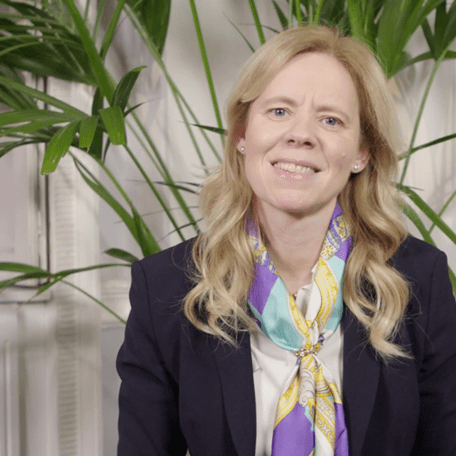- Our introduction of Secondary Scores and Market Regime indicators a decade ago has allowed us to exploit periods of market dislocation, such as during Covid.
- Our Watchlist of Europe’s best cash flow stocks is cheap; it has only been cheaper on two occasions in in the last 30 years.
- We are positive on European equities because markets are in an uptrend, valuations are reasonable and corporate investment behaviour is responsible.
The science behind the Cashflow Solution investment process.
We developed our investment process to exploit the behavioural biases that arise from attempts to forecast – from both companies in their growth plans and investors as they value shares.
In our experience, a focus on cash flow is the best way to take advantage of these behavioural biases.
We look for stocks with a dynamic margin of safety. These will typically be companies generating significant cash from assets, run with a prudent approach to forecasting and caution in making large cash investments to pursue these forecasts.
Because investors are often too focused on forecasts – something we don’t do – we find we are often able to buy these stocks cheaply based on their cash flows.
Our process starts with the creation of our Cashflow Champions Watchlist – the stocks in our investment universe with the most attractive cash flow characteristics.
Enhancing the process with Secondary Scores and Market Regime Indicators.
In 2014 we introduced very significant process developments by introducing Secondary Scores and Market Regime Indicators. The Secondary Scores allow us to build a financial and style profile for stocks which are vital in helping stock selection.
We score each stock on the Cashflow Champions Watchlist list across four categories: Momentum, Cash Return, Recovering Value and Contrarian Value. All of these scores contain a combination of proprietary information on the financial profile of a company and data on its valuation and share price.
Our Market Regime Indicators guide us on the outlook for equity markets and the style tilt we want in our funds for the prevailing market conditions. These proprietary indicators look at lots of different data sets in markets: corporate behaviour, investors’ behaviour, technical market data and various market and style valuation metrics.
Taking advantage of market dislocations
Looking at our Investor Anxiety indicator in more detail, this has played an important role over the years in helping us getting our style positioning right.
Our research found that when investor anxiety is low, you want to have more exposure to growth stocks. A positive tilt to growth was very beneficial for our funds from 2014 to the end of 2019.
When Covid came along in 2020, our Investor Anxiety was key in highlighting the contrarian value opportunity that was emerging. Our historical analysis clearly showed that when investor anxiety is high, value typically outperforms. We rotated the portfolios to value, a move which paid dividends in subsequent years.
Today, investor anxiety is in line with the long-term average so we have more balance by style in our funds.
Cashflow as an investment style is currently cheap
The current valuation of our Cashflow Champions Watchlist of stocks is currently very cheap. In fact, it’s only been cheaper on two other occasions over the last 30 years – in 2001 and 2020.
Those two occasions proved to be excellent entry points into the investment process with significant outperformance in subsequent periods. We think the set-up is similar today.
A positive outlook for European equities
We have a positive outlook for European equity markets. There are three principal reasons for this: European markets are still in a technical uptrend; market valuation is reasonable; and we see little sign of poor investment behaviour by corporates.
About the presenters
James Inglis-Jones joined Liontrust in March 2006 to develop the Cashflow Solution investment process. He co-manages the Cashflow Solution range of funds with Samantha Gleave. James began his career at Fleming Investment Management in 1997, assuming responsibility for the management of UK equity portfolios in 1999. Between 1999 and 2002, he worked on JP Morgan Fleming’s institutional investment process and managed a wide range of retail and institutional funds as a senior portfolio manager within their European equity group. In 2003, he joined Polar Capital to manage a European market neutral fund. James graduated in 1990 with a First Class Honours Degree in Modern History from York University. He went on to gain a D.Phil in Modern History from Christ Church, Oxford.
Samantha Gleave joined Liontrust in 2012 and since then has managed the Cashflow Solution range of funds in conjunction with James Inglis-Jones. She began her career at Sutherlands Ltd as a Consumer Analyst before moving on to Fleming Investment Management as senior Investment Analyst covering Pan Europe where she worked with James Inglis-Jones. Samantha moved to Credit Suisse First Boston (Europe) Ltd in 2000 and was in a No 1 ranked equity research sector team (Extel & Institutional Investor Surveys). In 2005, she moved to Bank of America Merrill Lynch and became a Senior Equity Analyst and Director and won awards for Top Stock Pick and Earnings Estimates. Samantha graduated from Aberdeen University in 1995 with an MA Honours degree in Economics & Management.
KEY RISKS
Past performance is not a guide to future performance. The value of an investment and the income generated from it can fall as well as rise and is not guaranteed. You may get back less than you originally invested.
The issue of units/shares in Liontrust Funds may be subject to an initial charge, which will have an impact on the realisable value of the investment, particularly in the short term. Investments should always be considered as long term.
The Funds managed by the Cashflow Solution Team:
May hold overseas investments that may carry a higher currency risk. They are valued by reference to their local currency which may move up or down when compared to the currency of a Fund. May have a concentrated portfolio, i.e. hold a limited number of investments. If one of these investments falls in value this can have a greater impact on a Fund's value than if it held a larger number of investments. May, under certain circumstances, invest in derivatives, but it is not intended that their use will materially affect volatility. Derivatives are used to protect against currencies, credit and interest rate moves or for investment purposes. There is a risk that losses could be made on derivative positions or that the counterparties could fail to complete on transactions. The use of derivatives may create leverage or gearing resulting in potentially greater volatility or fluctuations in the net asset value of the Fund. A relatively small movement in the value of a derivative's underlying investment may have a larger impact, positive or negative, on the value of a fund than if the underlying investment was held instead. The use of derivative contracts may help us to control Fund volatility in both up and down markets by hedging against the general market. The use of derivative instruments that may result in higher cash levels. Cash may be deposited with several credit counterparties (e.g. international banks) or in short-dated bonds. A credit risk arises should one or more of these counterparties be unable to return the deposited cash. May encounter liquidity constraints from time to time. The spread between the price you buy and sell shares will reflect the less liquid nature of the underlying holdings. Outside of normal conditions, may hold higher levels of cash which may be deposited with several credit counterparties (e.g. International banks). A credit risk arises should one or more of these counterparties be unable to return the deposited cash. May be exposed to Counterparty Risk: any derivative contract, including FX hedging, may be at risk if the counterparty fails. May target an absolute return. There is no guarantee that an absolute return will be generated over the time period stated in the fund objective or any other time period.
The risks detailed above are reflective of the full range of Funds managed by the Cashflow Solution Team and not all of the risks listed are applicable to each individual Fund. For the risks associated with an individual Fund, please refer to its Key Investor Information Document (KIID)/PRIIP KID.
DISCLAIMER
This is a marketing communication. Before making an investment, you should read the relevant Prospectus and the Key Investor Information Document (KIID), which provide full product details including investment charges and risks. These documents can be obtained, free of charge, from www.liontrust.co.uk or direct from Liontrust. Always research your own investments. If you are not a professional investor please consult a regulated financial adviser regarding the suitability of such an investment for you and your personal circumstances.
This should not be construed as advice for investment in any product or security mentioned, an offer to buy or sell units/shares of Funds mentioned, or a solicitation to purchase securities in any company or investment product. Examples of stocks are provided for general information only to demonstrate our investment philosophy. The investment being promoted is for units in a fund, not directly in the underlying assets. It contains information and analysis that is believed to be accurate at the time of publication, but is subject to change without notice. Whilst care has been taken in compiling the content of this document, no representation or warranty, express or implied, is made by Liontrust as to its accuracy or completeness, including for external sources (which may have been used) which have not been verified. It should not be copied, forwarded, reproduced, divulged or otherwise distributed in any form whether by way of fax, email, oral or otherwise, in whole or in part without the express and prior written consent of Liontrust.













